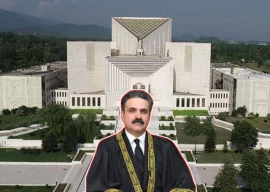
After being trapped in an abusive marriage for three months, Tanya Shafi finally took the plunge and asked for a divorce. But that was only the beginnings of her trouble.
“I had done nothing wrong, I just availed my God-given right to seek the annulment of a troubled marriage. Yet, I am treated as if I have committed a cardinal sin,” says Tanya with exasperation. “If I so much as even think about remarrying, people start questioning my character.”
Tanya is a 35-year-old single mother who teaches at a leading private school in Karachi. Her husband’s violent outbursts started early in her brief marriage, and despite her efforts to keep the relationship going, the toll it took on her quickly became more than she could bear. “I started to lose my memory and even my voice. I was left a shadow of myself,” she says.
Even then, she says, she may have stuck it out — but then she discovered that she was pregnant. “I thought to myself that by staying in this marriage I would not only ruin my life, but also that of my child’s.”
Ten years on, Tanya remains unmarried, though not by choice or a lack of offers.
“I get proposals from men who are either drawn by my family’s wealth and are seeking to establish themselves or else want me to leave my daughter with my parents,” says Tanya. By way of contrast, her husband remarried within six months of their divorce.
Most Pakistani women who get divorced or widowed have similar stories to tell. Not only are they haunted by the ghosts of their previous marriages, they also have to continuously fight for the respect they deserve. They become an easy target for all sorts of disparaging remarks and have to ward off questions that are put to their reputation.
“A failed marriage takes a toll on a man as well, but it is easier for them to remarry as they are not faced with as many roadblocks as women are,” says Nusrat Anjum, from Karachi’s Defence Women Welfare Society.
With over nine years of experience in providing matrimonial services, Anjum speaks with experience. “I have had male clients say they want a ‘better’ second wife as they want to put their first wife down by showing off their new bride to their ex. They want to show how easy it was for them to move on and find a wife younger and better looking than her. We have even had 60-year-old divorced men come to us asking for a young, unmarried girl,” she says.
Typically, a woman going into a second marriage simply does not have the luxury of being able to make similar demands. For the most part, she has to compromise on the man’s age, financial position, education and physical appearance as well as being willing to take on the responsibility of his offspring.
And of course, if she has children of her own then that’s another story entirely. According to Anjum, it’s very difficult to find suitable matches for women who have children. And the sex of the children gives rise to another host of issues.
“It may sound very cruel and unenlightened to say this, but in my experience women with daughters should either not remarry at all or else make the difficult choice of leaving their daughters with their ex or grandparents as they will be safer there. This is the bitter reality,” says Anjum.
And then yet another factor that enters the equation is whether the woman is a widow or a divorcee. Bilqees Mustafa, who works as a marriage bureau coordinator in Lahore, says the odds are stacked against divorcees. “Many clients completely refuse to even give a divorcee a chance and that attitude is even worse when it comes to a woman who sought the annulment of the marriage herself. They are seen as headstrong and domineering,” she says.
It’s this attitude that rankles women such as 54-year-old Saima Moin, a divorcee who opted to remarry after loneliness drove her to depression. “I used to have sleepless nights as I could not share my thoughts with anyone and had no one to talk to,” she says. “I also felt a lot of pressure from people around me when I decided to remarry but I am glad that I stood by my decision and went through with it.” Looking back at her experiences, she says she wishes people judged less and sympathised more. “Woman as well as men can get lonely and need companionship,” she says.
While Saima’s story does have a happy ending, many other women are not as lucky.
Forty-year-old Shahana Pervaiz, who runs her own salon, faced intense resistance from her family when she decided to seek a khula. She belongs to a middle-class family where marital spats are traditionally settled by elders and it didn’t help that she was the first woman in her extended family to have sought an annulment.
“I was shunned and seen as disrespectful when I stood by my decision in spite of their disapproval. They wanted me to reconcile with my husband, who beat me up constantly and couldn’t even financially support my children, only because the elders didn’t approve of divorce. Even when it comes to remarriage, our family has a rigid and conservative mindset and doesn’t appreciate women who take such a step,” she says.
Shahana isn’t the only one who had to suffer her own family’s disapproval. “A daughter is a daughter only so long as she’s unmarried. Once she gets married, she is treated like a guest in her parents’ home and if her marriage fails, she is treated as an outsider and a burden,” says Tanya.
The irony is that women like Shahana, Saima and Tanya, who need more emotional support from friends and families to recover from their failed marriages, instead have to face resentment and resistance from the very people who should be supporting them. Without such support, many women withdraw into themselves. The lucky ones, few and far between, manage to find new sources of strength.
“My marriage was such a dreadful experience that I lost trust in men altogether. This is why, in spite of good marriage proposals, I haven’t been able to make myself go through with it,” says Shahana. “When I needed the love and support of a man, I had none. Now that I am independent and capable of supporting my children, I don’t really need a man anymore.” Even when she considers remarriage, she says it’s the thought of what might become of her children that stops her in her tracks. “If my children’s own father didn’t care about them, how will a stranger protect them and accept them as his own?”
While Shahana tries to survive as a single woman in a man’s world, every single interaction with society at large brings yet another reminder of how deep-seated certain perceptions are.
“When I go to an office to get some work done, I have seen that I am respected only until my computerised national identity card comes out. As soon as people find out that I don’t have a husband, I see a complete change in their approach towards me,” she says.
But there is light at the end of this particular tunnel, and despite what you may think, it’s getting brighter. While much of Pakistani society remains mired in regressive traditions and mindsets, attitudes do seem to be changing for the better.
In Bilqees’ experience, the educated and upper socioeconomic classes of Pakistani society have become more welcoming of the idea of a woman’s second marriage. Since 1999, she has made more than 5,000 successful matches and has assisted numerous women in marrying again.
“In my professional experience, where there is education and a true understanding of Islam, people are more open towards a woman’s second marriage,” says Bilqees, who has made more than 5,000 successful matches since 1999 and has assisted numerous women in remarrying. “I have even had cases where children themselves have brought their mothers for a second marriage,” she says with a smile.
For some women, remarrying has come easy. “Compared to other women, it was very different for me. I was very lucky in every regard, and maybe that’s because second marriages have never been a hush-hush thing in my family. They are not thought of as a social taboo,” says Mona Qasim, a leading entrepreneur based in Karachi. “My current husband and I both went through bad marriages and we both have children. Everyone, from our previous spouses to our children, accepted our decision. And since we knew we were not doing anything wrong, we never allowed anyone to make us feel like we were.”
In spite of the positive change in our society’s viewpoint most women, principally those belonging to the middle class and lower, still have to fight a solitary battle in order to erase the ugly blot that is unfairly placed on their reputation. Many succeed in finally gaining marital bliss but still have to face the slander that comes with the ‘2.0’ label they carry. Ultimately, says Nusrat, it all comes down to education and awareness.
“Girls need to be educated in school about the rights they have, both through religion and the law, so that they don’t back down when faced with an onslaught of criticism,” she says.
Published in The Express Tribune, Sunday Magazine, May 20th, 2012.
COMMENTS (18)
Comments are moderated and generally will be posted if they are on-topic and not abusive.
For more information, please see our Comments FAQ







1730379446-0/WhatsApp-Image-2024-10-31-at-17-56-13-(1)1730379446-0-270x192.webp)
1724926799-0/Untitled-design-(7)1724926799-0-270x192.webp)








I would still say do a little bit of coverage and background on the men's side of the story.. It can sound very very different.. If it's just a one sided story then this does not hold a candle to some of the situations I've seen.. Again while agree that domestic issues are on the rise you can't really just place the blame on men.. Look towards the other side as well..
I've a bitter experience of 4months marriage, and the main character was my own ex-husband, he was greedy for my dowry and he just used me and leave me at my parents's house when I got pregnant, he snatched all jewelry my haq mehar, my dowryand gave me divorce and lies that I asked him for khula and he did not write about my pregnancy in my talaq nama , any how now after 10 years he is also denying that if he have any child from me. this is a real situation of a woman here in Pakistan .
Good article; and as a Pakistani 20-something man, I completely agree with Mawali's comment! As manly and confident as Pakistani men make themselves out to be, most of us are in reality a bunch of cowards, trying to establish authority by bullying those whom we perceive as weak.
Most people think that these issues do not arise when the men are "educated," but this is completely false! My advice to young women would be to prioritize financial independence and education over getting married. That way, you can at least dump him and get on with your own life.
It is so sad that this backwards mentality of blaming the woman for everything from being raped to the collapse of her marriage is still active in Pakistan, especially since none of this is consistent with Islam. We really need to educate the nation, only then will this backwards mentality be erased. Also @Sam, I agree with you. As a disabled person myself, I have experience such ignorance at the hands of asian/pakistani's. Even though I am a lawyer, I am still seen as a third class citizen at gatherings and people still look at me with sympathy and pity. The best thing to do is to rise above it, just keep working hard and InshaAllah these things will work out.
Totally agree with @Kamal. I don't thing most men are bad. The women can just cry wolf. The truth maybe would never be known as alot of women do make up stories especially when the man instigates the divorce.
I always identified with my mother, I felt her pain and suffering. My father used Sharia laws to get another wife. He felt no guilt or shame. We need to change our laws to make women equal and not live with laws of thousand years ago.
Educating girls about their rights is very necessary. At the same time there should be talk of boys being educated about their responsibilities as the other half of a married couple. This in our society, should really start from the mother who from day one puts her 'darling son' onto a pedestal and ingrains in his head that he can do no wrong because he's a male, and that is the start of the troubles.
its a shame onus how we treat women when in the quran Allah clearly says that women should remarry as soon as their period of waiting after their divorce is over. no wonder why we as a country are in such a bad state. in the QuranAllah also says that when we follow a few things from the Quran while ignoring others then we shall face zillat in this world and azaab will be waiting for us in the hereafter. look at how we treat our orphans, our khwajasaras and our minorities. Sometimes I wonder why we even call our country an islamic republic.
All the more reason why women need to achieve financial independence and reject the draconian practices of using women as a commodity. It's pathetic to live amongst people who keep their daughters under locks and hope that somehow, someway an abuser would ride in and claim her hand in marriage only to abuse her the rest of her life. A Women in Pakistan is nothing more than an instrument of sexual gratification for lechers!
Very well written, a true account of our society. I believe it is one's person matter whether he or she marries, remarries or does not marry at all. No one should judge other people on the mere fact that someone is divorced or widowed, as one cannot imagine the life of the person who is going through that situation.
Facepalm. x[
I am involved in social work in Canada and we although I understand that there is no excuse for abuse in a relationship, I actively try to help South Asian couples work through marital problems. From my my experience, divorced Indian women are virtually ostracized from the local Canadian Indian community after divorce and the Indian man invariably flies back to India for a new younger bride. The women often lament that they wish they hadn't sought a divorce for the sake of the children who are often very troubled.
We have to change.. and think for providing rights to our women.
And what about the persons with disabilities, they are facing much worse then the women with divorce, as disabled person i feel its so hard for disabled person get marry, getting marry is a step after many steps like facing the society and people who are passing comments while walking through streets which harder to bear, then education then transport, life so hard for special persons to survive, but if somebody survive luckily, marriage for disabled person is almost impossible, until somebody with awareness and open heart is willing to marry a disabled person, having a masters degree in computer sciences and also doing a good job, i am sorry to say our society is dysfunctional.
This is sad
if you may agree, do not even respect women as it always comes for something inferior to us. just seek a frank and modest behaviour with them. both genders feel obligations for each other. peace !!
do not respect women as respect comes for something which is inferior to us. just try to make a very frank and modest relation and both genders must feel obligations for each other. peace !!
While the article makes a strong point and i completely agree with the fact that abuse in our society is very high and thus the ratio of divorces has gone up and while it is also true that divorced women are shunned and generally viewed in a negative light. But the thing that i wanted to point out is that this is just one side of the story. Perhaps a view on the opposite gender might help as well.. Not all men are evil..